ROADHOUSE REVIVAL
No Hooting Please, Flick Lights
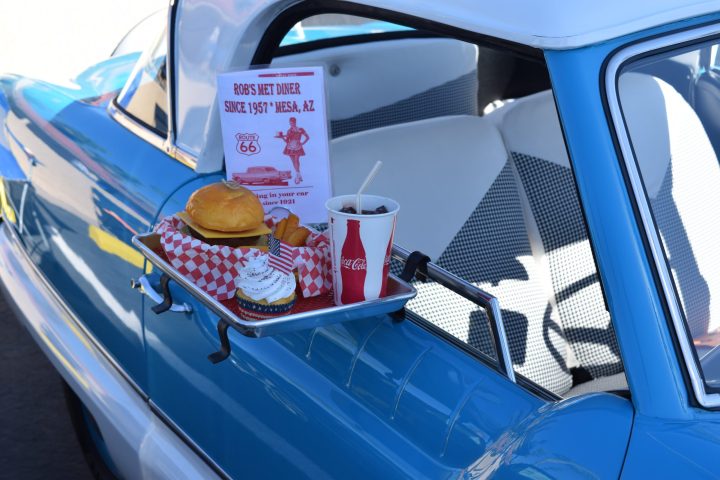
Good old fast-food. Crayfish to your car window. Service on a tray. Late-night haunts. Iconic dining spots once legendary. Then change, aka life, happens. A sentimental journey?
Roadhouses. Dashboard dining. Memories of what was, once upon a time, a norm. In the case of Durban, during the tray-in-window nosh-in-car heyday and for a lengthy period, these were the only late-night spots, midnight-hour-and-beyond. Places to go if you were out and about on wheels, beyond the age of a parent-inflicted curfew, and disinclined to head home.
Ours here in Durbs were iconic in their own way. Read on. But not hugely eccentric. Trawling the web I find pictures of roadhouses with old Viking and Dakota planes as rooftop accoutrements. An eponymously named Flying Saucer. A strangely creepy cavernous white canine called The Spotty Dog. I see these and other quirky park-off-and-eat diners that have gone the way of the dinosaur on a fun link called retrospective South African roadhouses that is worth a visit.
I also find a few here-and-now in-car roadhouse dining options that appear to be pretty established. As distinct from the Covid-inspired examples of resourcefulness, desperate times calling for desperate measures.
Would I write about roadhouses, new and old? The message from TGIFood editor, Tony Jackman, popped into my WhatsApp after he read that Ocean Basket Umhlanga had introduced in-car dining as an inventive attempt to save jobs and livelihoods. This at the start of our most recent brutal Level 4 restaurant and alcohol sales prohibition.
If I might digress and include a rant I came upon on Facebook back then and thrown in here as a kind of “if the cap fits, please wear it” plea: “So here we are back to Level 4 lockdown but it’s no good blaming CR17, he’s just the messenger. The blame lies with the anti-vaxers and Covid denialists and those dumb fuckheads who won’t social distance and wear a mask. Come on people, shape up.”
Right.
Okay. We’re back now eating in restaurants again. And the surviving liquor stores have reopened. (I’m in Durban where the corner Tops and connected QuikSpar near my home remain trashed, boarded up, abandoned, after the recent looting/insurrection/KZN devastation.) Some of us are vaxxed, wearing masks, distancing, dining in well-ventilated spots permitted to pour wine till 8pm. Restaurants are to shut by 9pm so staff can be home before the 10pm curfew time. Small mercies.
Terri Coetser, who runs the Umhlanga Ocean Basket, says the in-car dining plank option is “of course” here to stay and proving popular. A KZN spokesperson for the franchise said the availability of secure parking had been the determiner, nationally, on which branches could introduce the option.
And meanwhile, I learn that Jackman, my epicurean editor, has fond memories of roadhouse dining, inspired by the legendary long-gone Doll House in Mouille Point, Cape Town. “Opposite the lighthouse. Window wound down, cold crayfish tail, chips and salad on a tray. Unforgettable. All for about R1.25. It is still the benchmark for me of what kreef should taste like.” I read his words when googling; researching roadhouses old and new.
More famous, given all those who refer to it both online and when I probe folks for their roadhouse memories, was the Joburg Doll House, off Louis Botha Avenue. It is the focus (Mouille Point also features) of a dedicated “Dollhouse appreciation” group on Facebook, which has more than 4,000 members.
This legend only shut its doors for demolition and development in August 2017, I learn in a definitive must-read roadhouse article published four years ago this month, which evocatively begins: “The sign says: ‘No Hooting Please Flick Lights.’ Don’t wake up the dolls. An ancient waiter appears, not much younger than the Doll House, which opened in 1936. He doesn’t want to talk about the place or its looming closure. But he brings me a bacon-and-cheese burger, which arrives on a heavy plate, resting sweetly on a steel tray, hooked onto my window.”
Aha. The window tray. What defined/defines the roadhouse experience for many of a certain age. Younger, if you lived in Joburg and were still frequenting the Doll House in 2017. And not something, given my research, that any roadhouse has now. The window-service trays, I mean.
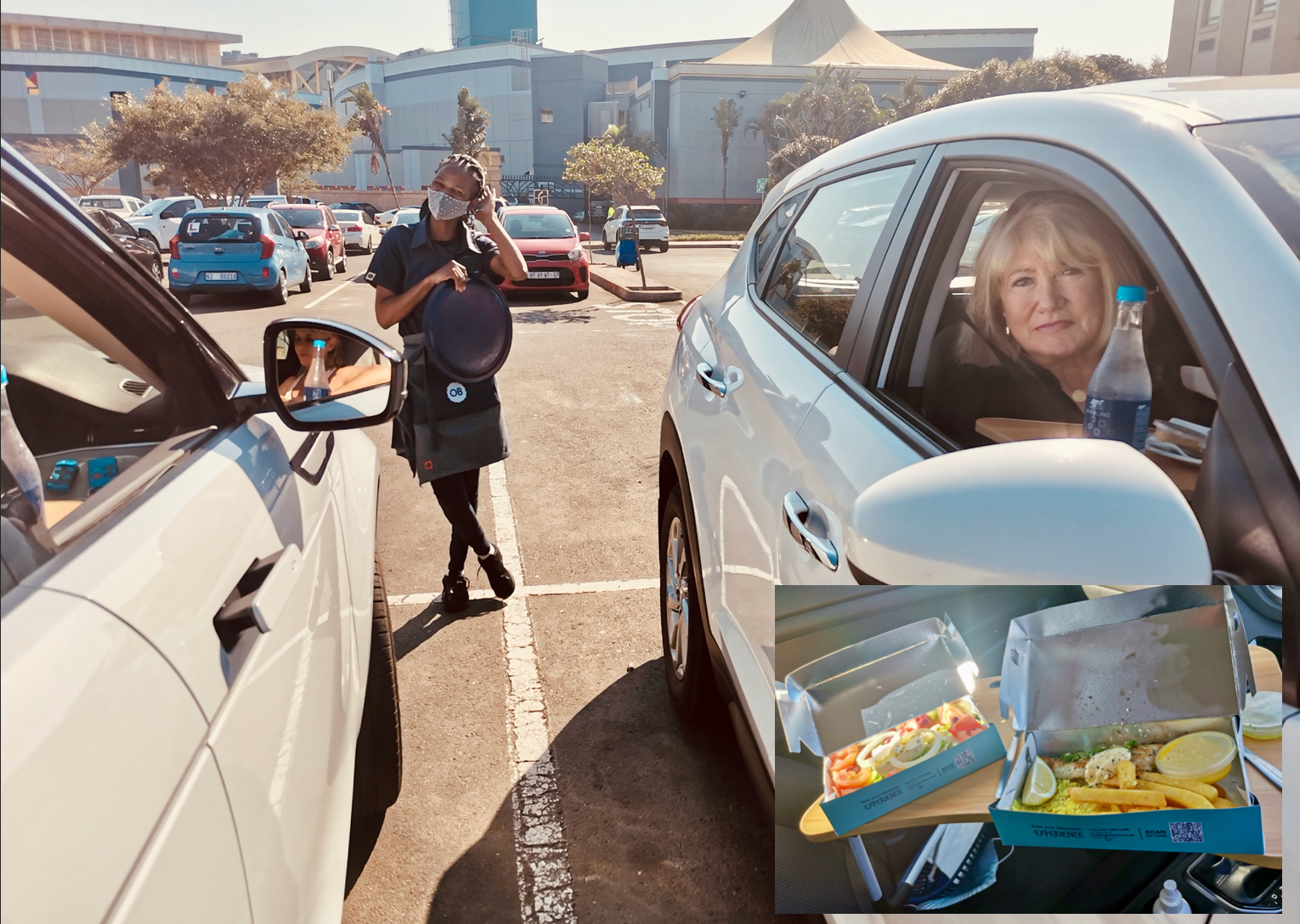
Vibeke Meehan meets a friend for a car-to-car lunch. Inset: The food came on trays with legs. (Photo: Vibeke Meehan)
“We read about Ocean Basket’s in-car dining and a friend and I decided to give it a try when restaurants were closed for sit-down; open for takeout,” says Vibeke Meehan, a self-described “fun-loving Durban socialite”.
They went to the Gateway branch. In two cars, it being Level 4. “I double-parked when we got there. Ran in to ask how and where to park and order.”
She was told to drive round the corner to the open-air parking lot and call from there with car make and number. “We parked front to back so we could talk to each other through our driver-side windows while distancing. And I give them 10 out of 10 for initiative. The service was friendly, the waitresses having great fun. They brought the food – fish and chips and salad – very nicely presented in little boxes. There was a salt and pepper grinder and a proper knife and fork.”
But something came as a surprise. “We didn’t get the plank I’d read about. Each of us got a little tray. With legs. Like you might have in a hospital bed. You couldn’t put it on your lap. It was difficult to balance. But it kind of worked when I put it on the passenger seat. Definitely not the sort of nifty little tray they’d put in the car window, like in the days of the Tropicale.”
The Tropicale. A favourite way back (it closed mid-1990s) for al fresco dining – and for several of its earlier years as a park-and-order dine-in-(your-car) roadhouse – in Albert Park. “Every time my dad was away, growing up, my mom would take us there for a toasted cheese and tomato sandwich and a double thick chocolate milkshake.”
To call back the past, do a search for “Tropicale” on the Durban Down Memory Lane Facebook page. Read about “that fancy tray that attached to the car door”; the “double thick milkshakes where you could turn the glass upside down and the milkshake would not run out” and where, “When you got to the age of dating, this was the place to be”.
Alternatively, if you were in Durban, The Nest or The Cuban Hat were places to be.
“After disco-dancing for five hours you’d need sustenance,” says Meehan. “Head to the beachfront for a hamburger, a milkshake and a kerfuffle before being home at midnight. You know that story…”

Durban beachfront’s two iconic roadhouses from way back. (Photo: Supplied)
Back in the 1970s Michael Pampallis was studying law at what is now UKZN Howard College campus. “We were doing our Articles. We’d work all day. Go to lectures on campus before and after work. Then gather in the evening to study in the boardroom of a law firm at the corner of Smith and Field (Anton Lembede and Joe Slovo). Then, before heading home, there was the midnight run. Most of us didn’t have cars. Those who did, we’d pack in: five or six per vehicle.” With that, it was off to The Nest for pie, curry gravy and chips.
“It’s where Durban hung out. A gathering place. How I think of it is almost similar to what the (more recent and pre-Covid) braai scene was after rugby, except that you bought your food.”
Pampallis’s dad back then had opened and was running what was Kings Coffee Bar on Aliwal Street (now Samora Machel), near to where they were studying nights. “The coffee shops, restaurants, convenience stores in Durban at the time were mostly run by Greeks and other immigrant groups. Immigrants are typically entrepreneurial in any community as people who’ve been prepared to get out of their comfort zone. My dad had come from Cyprus and was behind the counter working in a tea room when he was 15.”
Pampallis, a long-time lawyer who now runs a chain of franchise stores in the fast food business, connects me with Sotiri Spetsiotis, who came from Greece, married Pampallis’s late mom’s cousin, and owned The Nest from 1973 to 1981.
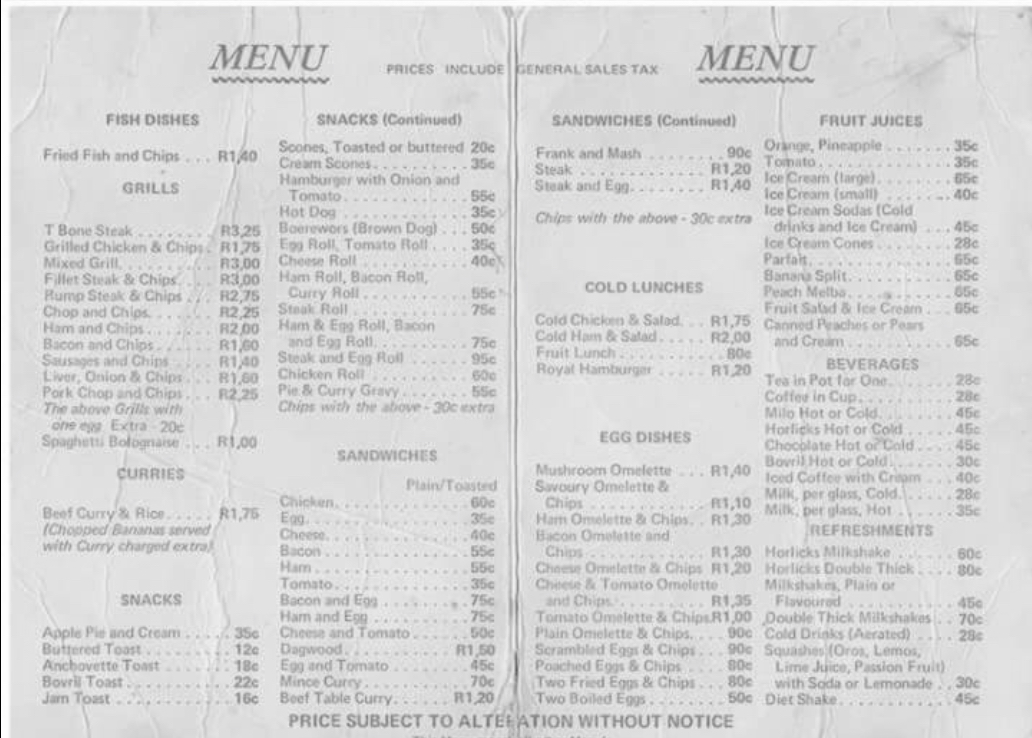
A menu from The Cuban Hat at Durban’s North Beach from back in the day. (Photo: Supplied)
That is when the Durban City Council terminated the month-to-month leases of The Nest and Cuban Hat, Durban’s most iconic beachfront roadhouses, to develop what is now a hodgepodge of fast food joints including a Wimpy alongside Durban Surf Lifesaving Club (DSLSC) at North Beach.
Fond memories; funny memories. Spetsiotis has them by the score. “We were in competition, The Nest and The Cuban Hat. But not really,” he laughs. “The menus were more or less the same. I was one cent up one month, he was one cent up the next month. They were never open 24 hours, which we were from 1976 when we became the only place in Durban you could get pie, curry gravy and chips 24/7.” The curry part being “because, it being Durban, we had an excellent Indian chef.”
Both he and Pampallis tell me, separately, the story of the undercover cop soliciting a legendary Indian waiter for grass, aka dagga (cannabis). The waiter, aware it’s a set-up, says “Sure!”, goes out back, picks some (lawn) grass, rolls it in newspaper, gives it to the cop. “Who gets very excited. Takes him off to the station, keeps him there for the night.”
In court the next morning, the grass is revealed for what it is. The cop, seeing he’s made an idiot of himself, attempts to change the charge to fraud. (The magistrate throws it out.)
The Nest could dish up a mean steak for the Vaalies. “The upcountry people only knew steak and chips.” (Sorry, upcountry folk of yesteryear. Durban Publicity did have a helluva time trying to stomp out a popular-with-locals “Welcome to Durban: Now Go Home” bumper sticker campaign that would surface when the holiday hordes arrived.)
The mixed grill was a speciality, says Spetsiotis. “A chop, a piece of boerewors, a piece of rump, a fried egg and a sausage, beef or pork. That was probably our most popular dish.” He believes it was he who first served calamari and chips in Durban. Which a Vaalie ordered not knowing what it was. “He came running from his car with the plate calling for staff to get rid of ‘these bloody goggas’…”
Spetsiotis remembers raising the price of coffee from four cents to five cents a cup. This led to a newspaper article with a front page picture. “Shark!” shouted the headline, with lifeguards pointing down at a picture of him, The Nest and the price from on top of their tower.
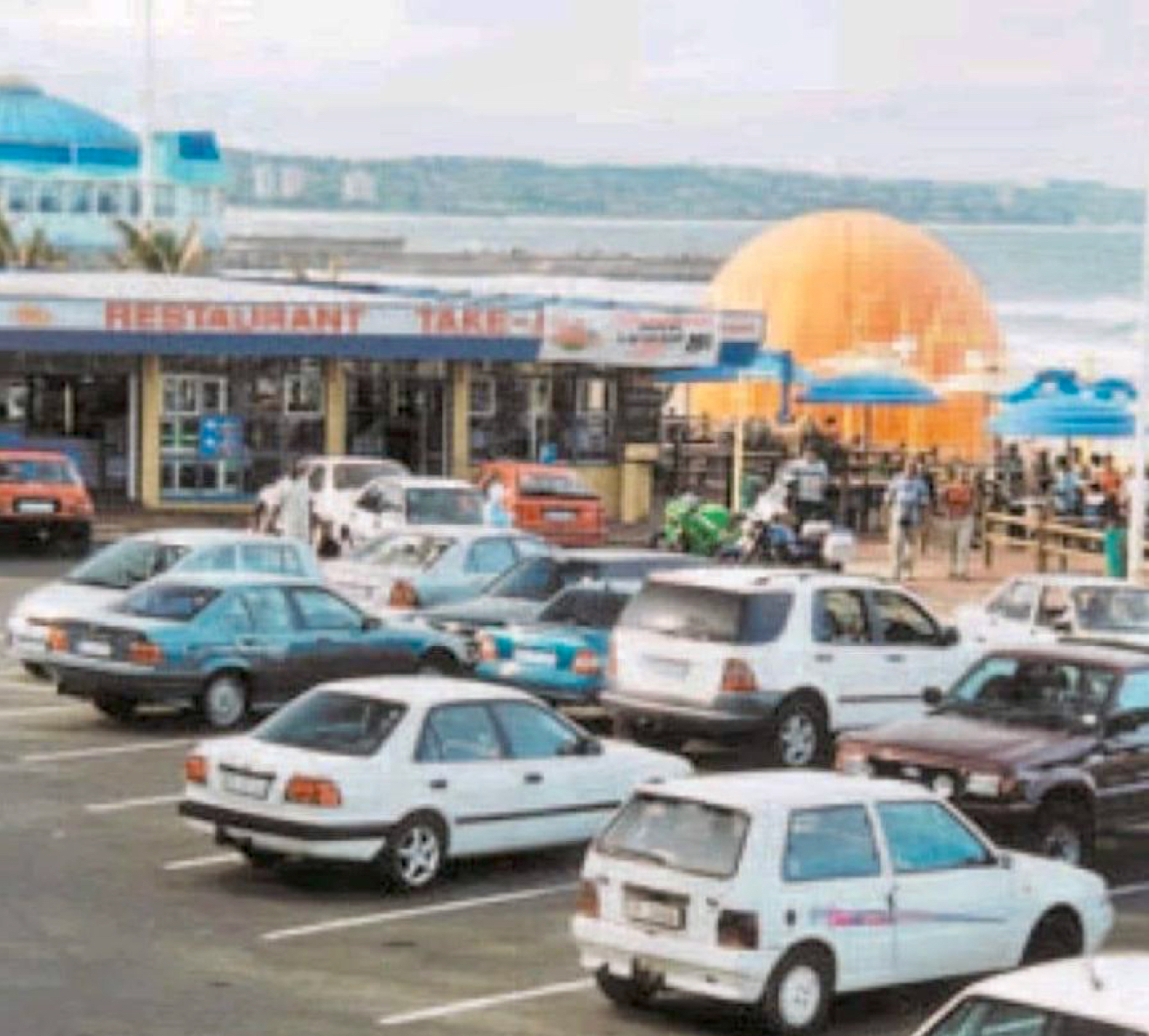
The XL, another of Durban’s legendary erstwhile roadhouse spots. (Photo: Sotiri Spetsiotis)
“The Nest and The Cuban Hat were where the lifesavers, the surfers (sometimes yours truly), everyone hung out. There weren’t many gathering places then.”
In 1977 Spetsiotis bought the XL at South Beach, which became another 24-hour café and for a while a roadhouse with car service.
“There, you had people from the beach during the day. But after dark anything could happen.” The parking area just wasn’t safe and suited for car service. And that is a basic requirement.
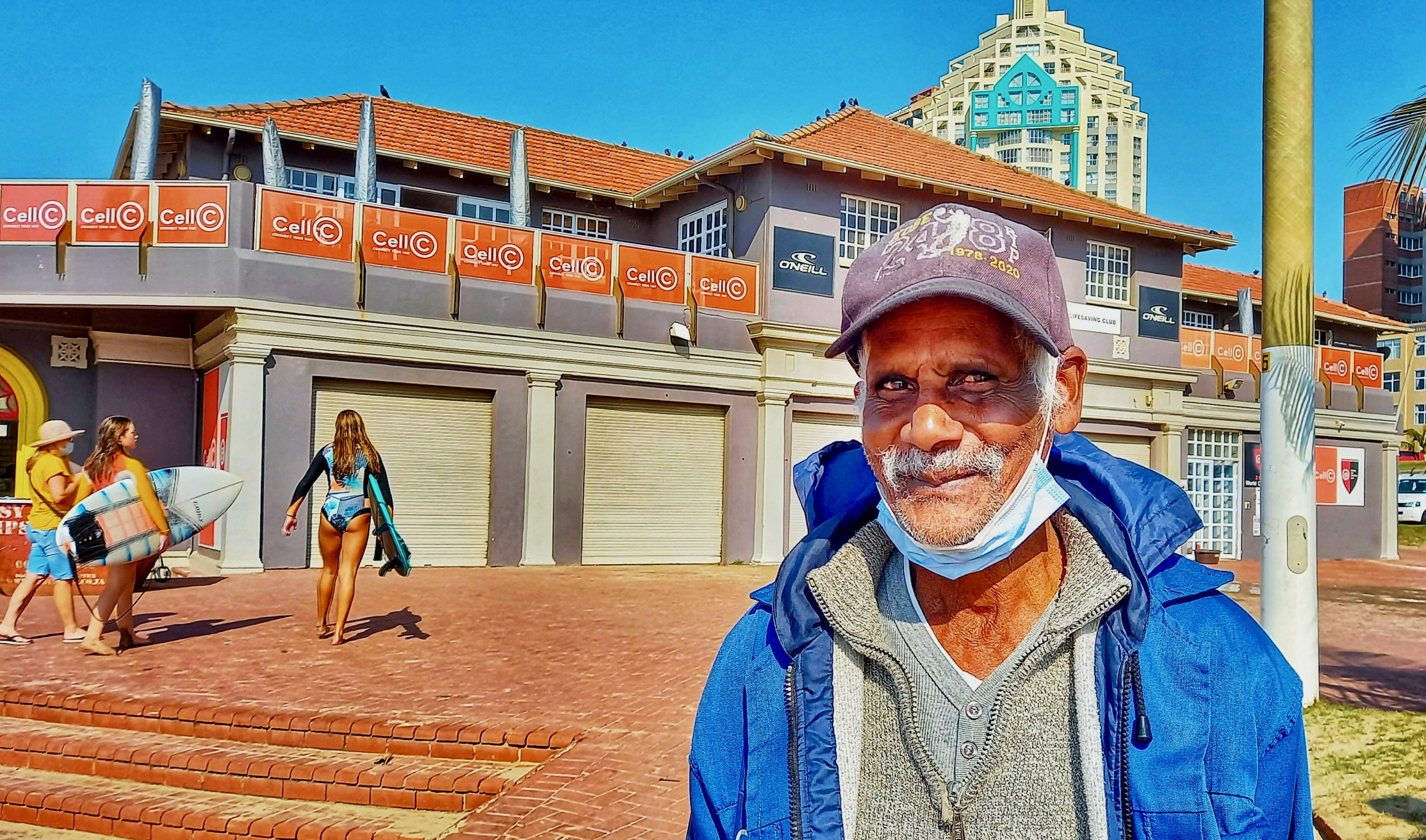
Nanda Subramoney started waiting trays aged 14 at the very spot where, at 72, you’ll find him selling newspapers. (Photo: Wanda Hennig)
Probably the most legendary legacy from those Durban beachfront roadhouse days is Nanda Subramoney. I caught up with him outside DSLSC last Sunday.
Subramoney started at The Cuban Hat aged 14, waiting car windows, carrying trays, washing dishes. Later, toasting sandwiches, making milkshakes and when the chef didn’t turn up, flipping burgers. Selling ice cream and cold drinks on the beach.
This all at the very spot where – he turns 72 this week – you’ll find him seven days a week selling newspapers.
Some of his customers are old surfers who, back then, were young surfers and Cuban Hat regulars. “People take care of me,” the sweet, good-natured man smiles. All the other waiters he knew? “They’ve passed away.”
But, “I’m a legend at the beach.” He directs me to a newspaper story about him in the Durban Surf club. All the lifeguards, the surfers, the members know him. Many of the people living in apartments the length of the beach know him, make it a commitment to buy from him.
Away from the beachfront, back in the day of roadhouses, Donald Holliday was a lifeguard at the Germiston municipal pool. The long-time journalist, now in Scotland, has fond memories of the Kansas Roadhouse in the city where he grew up. “You might have been out with a chick to the 20th Century bughouse or the Rialto down the road. You’d finish the date with a hamburger at the Kansas Roadhouse. Or you could go there with your mates after you’d been on the piss. Or you could go there to get into a fight if that was your fancy.
“Good old fast food. Burger, sloppy chips and a Coke. Fish and chips I remember. If you were living large, a mixed grill, which was a couple of rand more.”
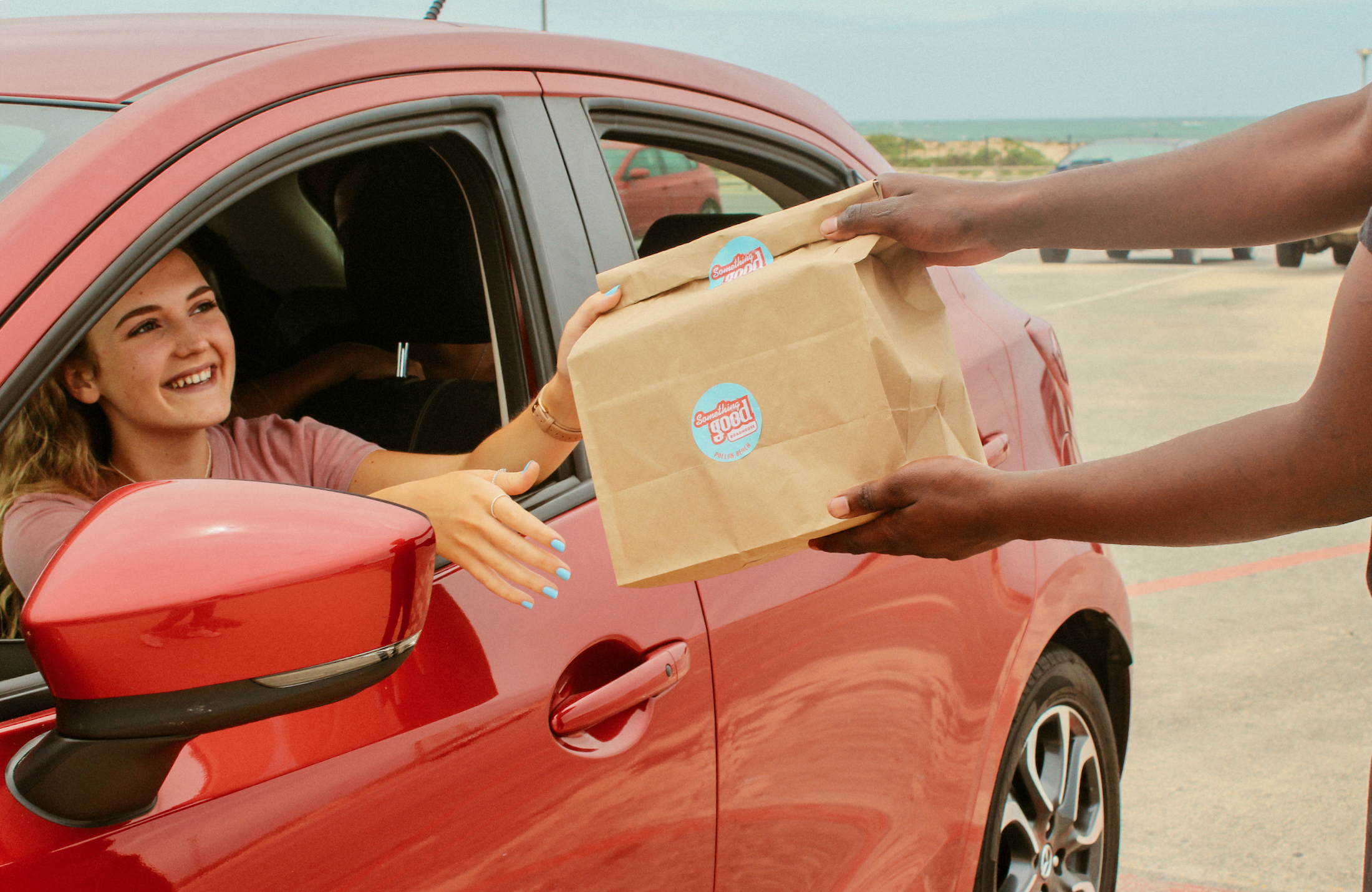
Car service with a smile revived at this beachfront Gqeberha roadhouse. (Photo: Anle Marais)
Anle Marais is marketing manager at Something Good Roadhouse on the beach at Summerstrand in Gqeberha (Port Elizabeth). “The roadhouse was here in the 1950s. It closed for about 15 years. About six years ago we resurrected it: there were such good memories.”
Since lockdown, they’ve stepped up the car service. “You flick your lights for service. On rainy days we put up umbrellas and the waiters run out with the food. It’s like a movie.
“During lockdown when restaurants were shut except for takeout, we had ladies from a couple of old-age homes come along in their cars. They’d bring knives. Plates. Serviettes. Sit in the car facing the sea. So desperate to get out. Eat their toasted chicken and mayo watching the ocean. Maybe they had good memories of the spot from long ago.”
I tried to rouse the people at Roasty’s Roadhouse Fourways where the nosh looks great and they seem to grow their own fresh stuff and do quality food. But nobody got back and I couldn’t get there from Durbs. So I will leave it to readers to explore and report back. And please share your roadhouse memories. New favourite places with a similar vibe.
Writing this story took me on a sentimental journey. It made me ponder the ongoing dialogue around “getting back to normal”. So many things, like roadhouses and service-on-a-tray. Once normal. Then gone. A reminder of change being the only constant.
So we can have the vaxx, wear the mask, do the distancing. Show resourcefulness. Deal the best we can with what comes up. But beyond that? Isn’t waiting for “normal” a bit like waiting for Godot? And meanwhile, life goes on. DM/TGIFood



 Become an Insider
Become an Insider
Wow, that certainly rang more than a few bells! Halcyon days…
Ah, that toasted crayfish and mayonnaise sandwich at the Tropicale after a night out clubbing…the stuff that dreams are made of!
Thanks for the memories, Wanda.
Memories! I think it should be Cypress (sic), or Cyprus?